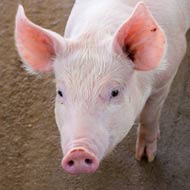
Scientists offer insights into colistin resistance
A team of international scientists has provided the first clues to understanding how the MCR-1 gene protects bacteria from colistin, a ‘last resort’ antibiotic that is used to treat bacterial infections that do not respond to other treatments.
Last year members of the same team identified MCR-1 as the first colistin-resistance gene that could be passed between bacteria, allowing resistance to spread rapidly.
Since then it has been found in common bacteria, including E. coli, in China, the US and across Europe in farm animals and, more recently, human patients.
The spread of MCR-1 has been linked to agricultural use of colistin and as a result, the Chinese government has now banned the use of colistin in animal feed.
Writing in Scientific Reports, researchers say colistin works by binding to and disrupting the surface of bacteria. But bacteria carrying the MCR-1 gene make a protein that changes the bacterial surface, to reduce the drug’s ability to bind to it.
This is the first indication of how MCR-1 behaves within the bacterial cell and will help to inform attempts to block MCR-1 function and restore colistin’s effectiveness against bacteria carrying the gene.
Co author Professor Adrian Mulholland, who is based at the University of Bristol’s School of Chemistry, said: “The importance of understanding colistin resistance can hardly be overstated: it is rapidly emerging threat to public health.
“Our results illuminate the structural and (for the first time) mechanistic basis of transferable colistin resistance conferred by mcr-1, thanks to the combination of biological, chemical and computational expertise brought to bear on this project.
“We are confident that our findings will drive efforts to understand mcr-1-mediated resistance and ultimately help identify routes towards overcoming MCR-1 activity in harmful bacteria.”



 The Veterinary Medicines Directorate (VMD) is inviting applications from veterinary students to attend a one-week extramural studies (EMS) placement in July 2026.
The Veterinary Medicines Directorate (VMD) is inviting applications from veterinary students to attend a one-week extramural studies (EMS) placement in July 2026.